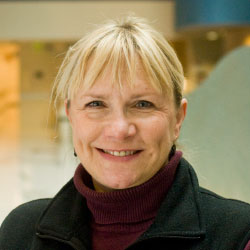Bjornson Lab
Let’s Move: Children With Cerebral Palsy
Cerebral palsy (CP) is the most common physical disability in childhood, affecting one out of every 323 children. While it has no known cure, early intervention can help children manage their mobility limitations and become more active participants in their lives. Through our volunteer research studies, our team aims to discover effective interventions that can empower children with CP to keep moving; to get out in the world and just be kids.
Our research focuses on spastic or hypertonic CP, which affects the coordination and control of motor function of more than 77% of children with cerebral palsy. We currently are conducting four research studies that aim to increase our understanding of how children with spastic CP can maintain or increase mobility, particularly as they age.
We are actively recruiting new participants for some of our current studies:
- A Study of Orthotics and Walking Activity in Cerebral Palsy
- PT3: Power Training Combined with Interval Treadmill Training to Improve Walking Activity in Cerebral Palsy
- Short Burst Locomotor Treadmill Training Study (SBLTT)
- Pedal With Pete Award: Study on Joint Decision Making in Supported Mobility Devices
- The Genetic Causes of Cerebral Palsy (Video)
- The Effectiveness of Non-invasive Electrical Stimulation of the Spinal Cord for Individuals with Cerebral Palsy
- Individuals 4-18 years old with limited mobility due to a neurologic condition such as stroke or cerebral palsy, who are able to participate in a 10-month study with weekly visits to the University of Washington.
- Please contact Siddhi Shrivastav about the ‘spinal stimulation study for people with neurologic injuries’ by email at [email protected] or phone at 973-444-1940 if you have questions or are interested in participating. Please remember that we cannot guarantee the confidentiality of any information sent by email.
We are also an official site for the North American Cerebral Palsy Research Network (CPRN). Treatment data from more than 20 sites in the CPRN registry enables clinician researchers to find practice variation, examine outcomes of care and create quality initiatives to improve outcomes for all patients with CP across the lifespan regardless of where they are treated.
About Dr. Kristie Bjornson

Kristie Fay Bjornson, PT, PhD
Kristie Bjornson, PT, PhD, MS, is a professor of developmental medicine, Pediatrics; and an adjunct research professor, Rehabilitation Medicine, at the University of Washington and Seattle Children’s Research Institute. She is also a pediatric physical therapist with over 40 years of clinical experience in settings such as the NICU, public schools, birth-to-three centers, and at Seattle Children’s in Seattle, Washington.
Dr. Bjornson was the research coordinator for the Spasticity Management Clinic at Seattle Children’s, serving as the project coordinator for the randomized clinical trial and meta-analysis of selective dorsal rhizotomy, botulinum toxin-A and a descriptive cross sectional study of intrathecal baclofen (ITB) therapy. Bjornson’s doctoral work focused on the assessment of physical activity, health and quality of life in ambulatory children with cerebral palsy (CP) and normative ambulatory data for the StepWatch accelerometer. She completed a NICHD NIH K23 career development award focusing on the measurement of ambulatory physical activity, participation in daily life of children with CP and the influence of orthotics.
Ongoing research includes a study of power training combining the Total Gym and treadmills, a home-based treadmill training study and a project examining the Ankle-Foot Orthoses Footwear Combination (AFO-FC) orthotic management approach for ambulatory children with CP. She has a small private practice focusing on orthotics management across the lifespan.